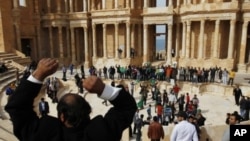A Libyan official is criticizing international actions against the embattled leadership of Moammar Gadhafi, including new U.N. sanctions. As the Gadhafi government consolidates its forces around the capital Tripoli, the opposition is trying to establish new government structures in territory it controls, while ordinary citizens nervously await what comes next.
Libyan government spokesman Moussa Ibrahim said Monday the sanctions adopted by the U.N. Security Council pose what he called a "real risk the West might intervene with military power." He also questioned the way the international body made its decision.
"They had no fact-finding mission in Libya," said Ibrahim. "They based their decision on media reports. Have you ever heard about a Security Council resolution that will decide the future of a country, based on media reports?"
The government spokesman also continued to characterize the protests against Libyan leader Moammar Gadhafi as anything but a popular uprising, and warned of more trouble to come.
"We all know what al-Qaida is doing in Iraq, and because of the West, so we have risks coming from three directions: from the West killing people, from al-Qaida killing people and from tribal conflict or regional conflict," added Ibrahim.
The Libyan opposition, which wants to end Colonel Gadhafi's nearly 42 years in power, continues to consolidate its gains. Various figures are stepping forward to lead the uprising that has taken hold in town after town across the North African nation. On Sunday, the latest self-proclaimed leader, Abdel Hafidh Ghoga said a newly formed "national council" would manage the daily affairs of opposition-held territory.
That territory extends to towns within 50 kilometers of the capital, Tripoli, including Zawiyah. Residents of Zawiyah said they were braced for a possible government counterattack as opposition forces gained control of the town.
In Tripoli, the government appeared to try to consolidate its position militarily, setting up more checkpoints and beefing up security.
One resident of the capital, who spoke to VOA on condition of being identified only by her first name, Amel, says she heard a lot of aircraft movement overnight.
"It's a very tense calm. It's like the calm before the storm," she said. "Whenever that is and whatever kind of storm we are waiting, we don't know."
Amel, who has stayed inside her home for more than a week now, described how friends have been able to supply her family with food. She also noted some improvements Monday, including in phone and Internet service, which the government had curtailed.
"I don't know what that means," added Amel. "I'm trying to think if that's an indication that there's a loss of control. I'm not sure. I don't know how to interpret that. Maybe it's wishful thinking. I'm not sure anymore."
The Tripoli resident says the situation is "pretty scary" and she is very anxious about when and how it will end. She worries if things remain the same, it will be very hard to stay in the country. She says she is trying to be optimistic and think about the "step after."
"We imagine a country which is free and open and some sort of vision of a legal system, a constitution, rights," she said. "This is what is giving us hope for our future."
Amel adds that if it is going to take time for things to end, to change for the better, "then we're willing to wait for as long as it takes."








